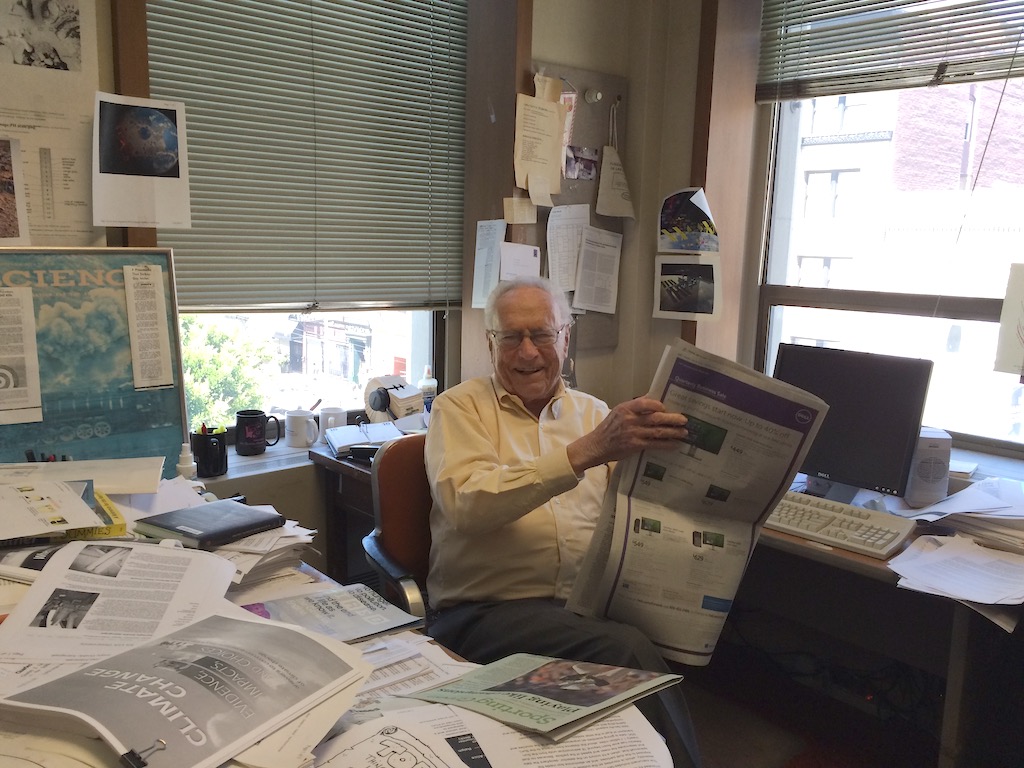
Celebrate Dave Perlman and support the future of science journalism
Dave Perlman at his San Francisco Chronicle desk. Photo by Ros Reid.
The remarkable David Perlman (1918–2020) covered science for the San Francisco Chronicle for 60 years and served as a CASW board member and president. Inspired by Dave’s commitment, we invite you to support the future of science journalism in two ways:
1. MAKE A GIFT to CASW to help us carry Dave’s legacy forward and to improve the quantity and quality of science news reaching the general public.
Help us reach our goal!
- Learn more about giving to CASW and how we use your donations.
2. SHARE YOUR IDEAS about activities that embody Dave’s commitment to the future of science writing. The CASW board and staff are working to develop programs that improve the quality and sustainability of science journalism. Your ideas could help inspire new activities. Do you have a suggestion? Let us know!
Click here, and feel free to share an appreciation of Dave while you’re at it!
- Learn more about Dave’s incredible career and contributions to science journalism.
| SUGGESTIONS | MEMORIES |
|---|---|
| Dave was the master of breaking news, so it would be wonderful to honor him with some sort of training session that would teach skills for fast and accurate reporting on science or health issues. Perhaps this could be tailored to reporting on preprints, which don’t offer the luxury of an embargo. — Richard Harris | I had the seemingly unenviable assignment of working at the other paper in San Francisco, which meant reporting head-to-head with Dave Perlman (and the likewise highly talented Charlie Petit). What an opportunity that ended up being for me! One of the most powerful tricks I learned from Dave was to ask the question “Let me see if I understand this correctly…” in which he could test out his paraphrases and analogies in real time. Better to make any mistake at a press conference than in print! Plus the answers also helped inform all the other reporters in the room. He was teaching and helping colleagues even while doing his own job. — Richard Harris |
| During our CASW board meetings, Dave spoke highly of the “traveling guru” program that sent seasoned science journalists on the road to talk about their craft with folks at local publications. Is there a 21st-century, internet age equivalent that we could try out as a pilot project? — Alan Boyle | Others knew him better and longer, for sure, but it seems to me he would have made the perfect lead character for a “Lou Grant”-type show … less gruff, more gentlemanly, but with tales and experiences to last many seasons. — Alan Boyle |
| Dave did some of his best reporting from exotic locales. I think a travel fellowship would be the best way to honor his legacy. Let some young and upcoming science journalists travel to Antarctica, or the Galapagos Islands (or, for that matter, to Cleveland) to cover a story no one else is covering. — Bob Finn | David managed the Herculean task of teaching me just enough about cosmology and seismology to get me through countless press briefings. For that alone, there must be pots of gold awaiting him somewhere. But I am most of all grateful for his friendship, his company, his hospitality, and his joie de vivre. A model mensch. — Joann Rodgers |
| I think the support for international science journalists to attend WCSJ was great, and perhaps an area of David’s legacy to build upon. — William Kearney | We cannot honor that remarkable man enough for all that he has contributed to science writing community. His readiness to be of service to young science writers makes me think that some portion of funds from the trust be used to enlarge CASW’s portfolio of fellowships (e.g., to aid younger writers in covering travel expenses to attend conferences, beyond ScienceWriters, and in pursuit of long-form stories). — Ben Patrusky |
| Best left to active CASW board members. I lean toward travel grants for reporters to meetings, workshops, possibly to news events. — Charlie Petit | My best friend, close colleague. Ethical to the max. He told me many times that the most important trait of a good reporter is to be responsible. — Charlie Petit |
| At the science writers conference in Flagstaff, David was in the hotel lobby when my colleague from the Royal Society and I arrived. I introduced David to her as the “grandfather of science journalism in the U.S.” For a moment I paused, worried maybe that wouldn’t go over well, but David laughed heartily and took it for the compliment it was. — William Kearney |